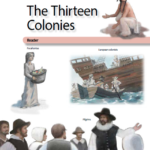Does a law that limits the ability of corporations and labor unions to spend their own money to advocate the election or defeat of a candidate violate the First Amendment’s guarantee of free speech? The Supreme Court has held that donations and campaign spending are forms of speech.
The Thirteen Colonies (CKHG Unit)

This unit explores the development of three regions of English colonies using primary source documents and imaginative narratives. Across 35 lessons, students explore Jamestown, labor by indentured servants, and the reliance on enslaved workers in the southern colonies, look at the motives influencing the Pilgrims and Puritans in New England and the financial and religious reasons for settling the Middle Colonies.